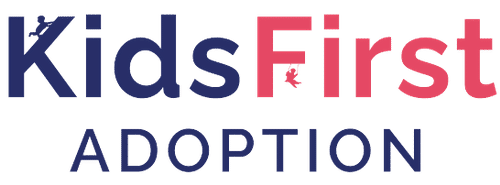A Resource Guide for Those Supporting Birth Parents
Introduction
As behavioral health professionals, you play a critical role in supporting clients facing difficult decisions about parenting and adoption. This guide aims to provide you with essential information to help you discuss adoption with clients in an ethical, compassionate, and informed manner. At KidsFirst Adoption Services, we believe that well-informed professionals can make a significant difference in helping birth parents explore all their options with dignity and respect.
1. What is the modern adoption landscape like?
There are several types of adoption that may be appropriate depending on your client’s situation:
- Open adoption: Birth parents maintain some form of contact with the child and adoptive family
- Semi-open adoption: Communication occurs through an intermediary like an adoption agency
- Closed adoption: No ongoing contact between birth parents and adoptive family
- Kinship adoption: A relative adopts the child
- Foster-to-adopt: Children in foster care are adopted by their foster parents
The level of openness is typically negotiated between birth and adoptive families, often with the support of an adoption agency. This evolution reflects a growing understanding that maintaining connections can benefit the child’s development and identity formation.
2. How can I recognize when a client may not be in a position to safely parent?
As behavioral health professionals, you may observe indicators that a client is struggling with the capacity to parent safely. These signs might include:
- Severe, untreated mental health conditions that significantly impair functioning
- Active substance use disorders without engagement in treatment
- Chronic homelessness or severe housing instability
- History of child maltreatment without meaningful intervention
- Expressed feelings of being overwhelmed by or disconnected from the parenting role
- Lack of support systems and persistent isolation
- Inability to meet basic needs despite connection to available resources
When these indicators are present, it’s important to:
- Approach the subject with compassion rather than judgment
- Frame the conversation around the child’s needs and the parent’s stated goals
- Discuss adoption as one of several options that might align with the client’s values
- Connect clients with comprehensive assessments and appropriate supports
- Acknowledge that many parenting challenges can be addressed with proper intervention
- Respect that the ultimate decision belongs to the client
- Recognize that temporary inability to parent doesn’t necessarily mean permanent inability
Remember that your role is to help clients make informed decisions based on their current reality, while acknowledging that circumstances can change. If adoption is considered, it should come from the client’s own assessment of their capacity, not from external pressure or assumptions.
3. How can I discuss adoption as an option without seeming directive?
Present adoption alongside parenting and other options as equally valid choices. Use language that promotes the parent’s own agency, such as “making an adoption plan” rather than “giving up” or “surrendering” a child. Focus on empowering your client to make an informed decision rather than steering them toward any particular outcome. Ask open-ended questions like, “What have you thought about your options?” or “What would you like to know more about regarding adoption?” This client-centered approach respects autonomy while providing support.
4. What emotional challenges do birth parents typically face?
Birth parents often experience complex emotions including grief, loss, relief, guilt, and uncertainty. These feelings may fluctuate throughout the process and continue long after placement. It’s important to normalize these emotions and provide a safe space for their expression. Many birth parents benefit from specialized counseling before, during, and after placement.
Choosing adoption can be both a loving choice and one that involves significant grief—these emotions can and often do coexist.
5. How do substance use disorders intersect with adoption planning?
Clients with substance use disorders may have additional concerns about adoption, including fears about judgment, legal consequences, or future relationships with their child. As their provider, you can help by:
- Ensuring they understand that seeking help for substance use demonstrates responsibility
- Connecting them with adoption professionals experienced in working with parents in recovery
- Discussing how their recovery journey might impact their adoption plan
- Addressing concerns about how their history might be shared with the child in the future
5. What rights do birth mothers have in the adoption process?
Birth mothers have significant rights throughout the adoption process, including:
- The right to change their mind about adoption prior to signing consent documents
- The right to select the adoptive family (in most private adoptions)
- The right to create an adoption plan including their preferences for contact
- The right to independent legal counsel separate from the adoption agency
- The right to receive counseling and support services
No one can force a mother to place her child for adoption. As a behavioral health professional, you can encourage clients to research their specific rights or connect them with an adoption attorney or agency that can provide accurate legal information.
6. How can I help clients evaluate adoption agencies or professionals?
Encourage clients to look for licensed, reputable agencies with transparent practices. Suggest they ask potential agencies about:
- Services offered to birth parents before, during, and after placement
- How they screen and prepare adoptive families
- Their philosophy on openness in adoption
- Financial assistance policies and transparency around expenses
- Post-adoption support services
- Reviews and references from other birth parents
You might offer to role-play these conversations or even attend introductory meetings as a support person if appropriate.
7. What about fathers’ rights in adoption?
Biological fathers have legal rights that must be addressed in the adoption process. These rights vary by state and circumstance (married vs. unmarried, established paternity, etc.). It’s important that both parents understand these rights. If your client is concerned about involving the father, connect them with an adoption professional who can explain the legal requirements and options while prioritizing safety.
8. What financial support can birth mothers legally receive?
Birth mothers can legally receive support for pregnancy-related expenses, which may include:
- Medical expenses not covered by insurance
- Reasonable living expenses during pregnancy and briefly postpartum
- Counseling services
- Legal representation
- Maternity clothing
These payments must be documented. It is crucial to understand that payment cannot be contingent on placement of the child or consent to adoption, as this would constitute baby-selling, which is illegal in all states.
9. What post-placement support do birth parents need?
After placement, birth parents often need ongoing support to process grief, navigate open adoption relationships, and integrate their adoption decision into their life narrative. This might include:
- Specialized adoption-competent therapy
- Birth parent support groups
- Assistance with managing contact agreements
- Support around significant milestones and triggers
- Resources for discussing their adoption decision with others
Consider familiarizing yourself with post-adoption resources in your community so you can make appropriate referrals.
10. How can I become more adoption-competent in my practice?
Developing adoption competence enhances your ability to serve all clients affected by adoption. Consider:
- Seeking specialized training in adoption issues
- Connecting with adoption professionals in your community
- Familiarizing yourself with adoption-related resources and research
- Examining your own beliefs and potential biases about adoption
- Joining professional organizations focused on adoption
Conclusion
As behavioral health professionals, your willingness to address adoption knowledgeably and compassionately can make a profound difference for clients facing unplanned pregnancies or parenting challenges. By providing non-judgmental support and accurate information, you help ensure that whatever decision your client makes is truly informed and reflective of their values and circumstances.
For more information or to connect with adoption-competent resources in your area, please contact KidsFirst Adoption Services. We’re committed to supporting both the professionals who work with expectant parents and the parents themselves through this significant life decision.
This resource was developed by KidsFirst Adoption Services. Founded in 1999 by Inna and Steve Pecar, KidsFirst is dedicated to supporting birth parents and adoptive families through compassionate, ethical adoption services.


